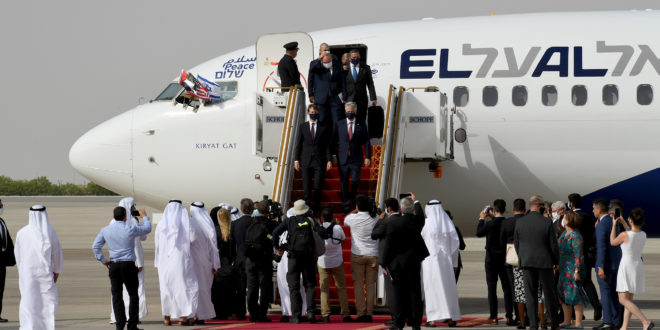Issue 30, summer/fall 2020
https://doi.org/10.70090/RA29PHAM
On September 16, 2020, U.S. president Donald Trump hosted the signing ceremony for the tripartite diplomatic normalization agreement, known as the Abraham Accords, between the United Arab Emirates (UAE), Bahrain, and Israel at the White House. The UAE is the third Arab country to declare normalization with Israel after Egypt (1979) and Jordan (1994). Bahrain is the fourth. They are, however, considered the first among the Gulf countries. The Israeli-UAE-Bahrain agreement triggered a multitude of controversies and garnered a great deal of media attention, both in the region and worldwide. News of signing the agreement between the UAE, Bahrain, and Israel dominated the global media. Coverage focused on the quadripartite statement released by the US, regarding UAE, Bahrain and Israel, and the resulting suspension of Israeli annexation plans in exchange for diplomatic, economic, and touristic relations with the UAE and Bahrain. This focus in print, and on visual, and electronic platforms reflects the importance of this bold step in moving peace forward and easing tensions in the region.
Background:
The origin of the peace treaties in the Arab region began between Egypt and Israel. The treaty that was singed in 1979 goes back to the Resolution 242 that was passed by the United Nations Security Council in November 1967. The 1973 October war gave life to Resolution 242 and Security Council Resolution 338, calling for a cease-fire and the implementation of Resolution 242, was passed in the same month.
May 1974 was the first time an Arab country (Egypt) started negotiations with Israel, agreeing on a disengagement of forces. In September 1975, the Sinai Interim Agreement took place, which took on a more tangible approach with the 1978 Camp David Agreements, and finally the Peace Treaty of 1979. Prior to that the only regular contact between Egyptians and Israelis had been on the battle field in 1948, 1956, 1967, and 1973 (Freeman, 2009). According to the agreement context, the peace treaty is intended as a basis for peace, not only between Egypt and Israel, but also between Israel and its Arab neighbors, each in its own right, who would be willing to negotiate peace on this basis.
A Quick Read of Media Coverage on the UAE-Bahrain-Israel Agreement:
News holds power in its ability to shape audience attitudes and affect public opinion (Lewis 2012). According to Lippmann (1992), “we rely on the media to explore the world around us and to construct our reality.” Although the media acts as a third party ‘watchdog’ providing feedback to the public on local problems and bringing hidden stories out into the public, it can also act as a gatekeeper to set agendas, filter issues, and try to maintain a balance of views. Media like to portray themselves as ‘balanced and fair,’ even when they privately seek to promote a particular ideological set of ideas and limit the public’s exposure to a wide array of information. The media has influence on policymakers, particularly as they think about how to prevent and respond to violent conflict (Kuusik 2010). It is also a tool for policymakers to communicate their message, in addition to a diplomatic tool, as it is used to share information about diplomatic initiatives and send messages back and forth between different sides. The media may also help to build bridges between enemies and build the confidence needed to open up dialogue (Gilboa 2002).
Foreign Media Coverage:
-
American Media
The New York Times set the stage with their coverage of the agreement positively describing it as momentous and quoting Trump describing it as historic “after decades of division and conflict,” explaining its guarantee to strengthen relations between the two Arab countries and Israel in exchange for Israel's relinquishment of its "declaration of sovereignty" over the occupied West Bank territory, while paving the way for a broader rearrangement in the region.[1] The article argued that the agreement will lead to greater cooperation in the fields of investment, tourism, security, technology, and energy.
The Washington Post reported the agreement between the three countries as a way for Trump to create “breakthroughs” in the Middle East. In an earlier article, the paper quoted Trump’s opinion about the agreement saying: “It is a step towards building a more peaceful, secure, and prosperous Middle East.” The Washington Post was keen to present the other sides of the story, namely addressing the Israeli settlers who are unhappy that Netanyahu, the Israeli Prime Minister, would give up his plan to claim sovereignty over West Bank territory. As for the Palestinians, they view it as a betrayal, quoting the Palestinian ambassador to the Emirates: “This agreement is a total departure from the Arab consensus.” In another article, the head of the Palestinian mission to the United Kingdom, Husam Zomlot, was quoted as saying that such an agreement “is very damaging to the cause of peace.”
In addition, an opinion piece published in the same newspaper expressed hope for conditions to improve in the Middle East, especially following the horrific explosion in Beirut and other conflicts taking place, in addition to the outbreak of COVID-19. As explained by the author, this agreement carries “hopes for development.” On the other hand, the newspaper also pointed out that some Israeli settlers and their political allies are disappointed that Prime Minister Benjamin Netanyahu will, in return, abandon his plan to claim sovereignty over the West Bank, after the UAE affirmed that the agreement depends on Israel fulfilling its pledge to abandon the annexation.
CNN described the tripartite agreement as a “historic normalization agreement” and “a win-win situation” since the UAE and Bahrain will benefit from Israeli tech, and Israel will shift audience attention away from problems such as the “tattered economy” and high unemployment rate. CNN quoted President Trump describing the agreement as the “dawn of a new Middle East” and “a foundation for a comprehensive peace across the entire region,” confirming that other countries in the region will follow.[2] CNN confirmed that the treaty casts a shadow over opportunities to open new doors for negotiation between Palestinians and Israelis. They pointed out that the UAE’s approval of the agreement was conditional upon the suspension of Israeli settlement building in the West Bank, yet the article raised doubts when it noted that the duration of the suspension was unclear, indicating that it might not last long. In an analysis piece, journalist Nic Robertson stated that although the agreement is historic, it is an “illusion” of the peace President Trump promised to deliver, and an indirect declaration that his initial peace plan is no longer valid, yet the deal increases Netenyahu’s “political fortunes.”
In an article on the Bloomberg website, the agreement was described as a “landmark” and a step towards a “historic shift in Middle East politics.” The article highlighted that the main rationale behind the agreement is to form a unified force against Iran. From an economic perspective, Bloomberg pinpoints the potential economic gains especially for the UAE, a federation of seven emirates including Dubai, which is an economic hub for the whole region. The economic gains for the UAE weigh those of Bahrain, Egypt, and Jordan. The article quoted Trump who assured that other Arab states would soon join the agreement, including the Palestinians themselves.[3] In another article, Nick Wadhmas reported that although details are thin, the agreement is a good step for Trump to win the elections.[4]
In reference to statements by Aaron David Miller, a fellow at the Carnegie Endowment for International Peace and former Middle East official at the US State Department, the news agency described the agreement as a "historic breakthrough" praised by many leaders around the world and a decisive step towards peace. The business publication Forbes indicated that the UAE-Bahrain-Israel agreement reflects the tolerant and open-minded approach of the Gulf countries. However, in another piece, Andrew Solender criticized the extent of the propaganda employed with this agreement, particularly given the two Arab countries in question (UAE and Bahrain) were not initially at war with Israel, and that the Israeli-Palestinian conflict remains unresolved.[5]
-
European Media
The website of the German broadcaster Deutsche Welle (DW) described the Isreali-UAE agreement as “a pioneering initiative of its kind.” DW also examined the general Arab reaction to the agreement, stating that the Palestinian leadership labelled it as a “betrayal of Al-Aqsa Mosque and the Palestinian cause,” naming it a “disgraceful decision” that will “push them to the sidelines,” and stating that the Palestinians are the “overwhelming losers” of this agreement. In an opinion piece, Ines Pohl argued that the main winner is Trump, as this agreement will be used to support his re-election.[6]
The Spanish newspaper El Pais described the agreement as a "major turning point" for peace in the region. The newspaper remarked that this agreement will unleash the great potential in the region and is considered a positive step.
British newspaper the Guardian described the agreement as “historic” and a boost for both Trump and Netanyahu. The publication also pointed out that fear of Iran’s movement is the primary rationale behind the agreement.[7] It also expressed the expectation that other Arab countries will likely join the agreement, albeit without mentioning specific nations.
The French broadcaster France 24 described the early news of the UAE-Israeli agreement as “surprising”, however explained that the agreement was not sudden, but rather the result of communication between the two countries going back to 2018. As news emerged of Bahrain joining the agreement, one article stated that the agreement is a way to boost Trump’s hopes of re-election and improve his status in the elections overall. The article also highlighted the strong coalition between the Gulf states and Israel to combat Iranian expansion in the Middle East, while also mentioning that it is seen as a betrayal to the Palestinian cause.[8]
-
World Media
The Israeli-UAE-Bahrain agreement was on top of the news agenda of other international media organizations.
Daily newspaper The Australian sheds light on the latest agreement, which comes 25 years after the last Arab agreement between Israel and Jordan in 1994, describing it as a victory for Trump and Netanyahu. The right-leaning paper expressed that the agreement as “more constructive” than anything that happened during Obama’s presidency, praising it as being an outstanding agreement amidst the tensions in the region.[9]
The Japanese Kyodo News Agency praised the normalization agreement, and the Press Secretary Tomoyuki Yoshida affirmed that the agreement is a step towards regional stability and a release of tension in the Middle East region.
The South Korean Yonhap News Agency echoed the tone of their Japanese counterpart and stated, according to Foreign Ministry spokesman Kim In-Cho, that the South Korean government welcomes diplomatic relations between the UAE, Bahrain and Israel and it too believes that such a step will lead to increased stability in the region.
The South China Morning Post, in cooperation with the US-based Politico website—which specializes in political affairs—published a report on the expected Emirati-Bahrain-Israeli agreement, describing it as a victory for diplomacy that would constitute "direct relations between two of the most dynamic countries in the Middle East” with the most advanced economies, and contribute “to changing the region by stimulating economic growth, promoting technological innovation, and establishing closer relationships between people."
Israeli media too communicated its support, showing optimism about the benefits set to emerge from the normalization agreement, especially in the sectors of trade and security. The media highlighted that the agreement will strengthen the Israeli position against Iran’s threat. Some commentators described the agreement as a “match made in heaven.”
The foreign mainstream media in general was in favor of the UAE-Bahrain-Israeli agreement highlighting it as a much needed and timely step. Most American media described the agreement as “historical” and assured the importance of the step after years of covert dealings. The European media maintained mostly positive coverage labeling it as “pioneering” and “a major turning point”, while at the same time reflecting the resentment on the part of the Palestinians. Overall, world media was a midpoint between balanced and positive, attempting to provide analysis more than just reporting on the agreement or labeling it.
-
Arab Media
News of the agreement between the UAE, Bahrain and Israel dominated the Arab media as well. The coverage has vacillated between anger and support for the agreement. Several shed light on Emirati and Bahraini celebrations and opinions that it constitutes a "historic achievement", while other newspapers focused on the Palestinian rejection and the angry stances towards the Emirati and Bahraini normalization of the occupation.
The Egyptian newspaper Al-Ahram’s main headlines were supportive of the official signing and the announcement that preceded it. (For instance, “Signing of the historic peace agreement between the UAE, Bahrain and Israel”)[10]. Al-Ahram also covered tweets from the Bahraini ambassador to Egypt, Hisham Bin Mohamed El Gawdar, saying “The Kingdom of Bahrain’s announcement of its support for the normalization agreement is a testament to the whole world of the King of Bahrain’s approach to commitment to peace as a strategic choice through which frameworks for initiatives to promote international cooperation, stability, peace and prosperity in the Middle East region are launched.”[11] The coverage reflects the position of the head of the Egyptian regime, Abdel Fattah Al-Sisi, who welcomed the Emirati and Bahraini normalization agreement with the occupation, and expects Sudan to be next.
In response to the announcement of the agreement, Al-Sisi tweeted his appreciation of the joint statement saying he valued the efforts of its facilitators in their effort to achieve prosperity and stability for the region, including a just and permanent settlement of the Palestinian issue.
Most private Egyptian media framed the normalization in a positive way, avoiding deep analysis of the consequences of the agreement, pinpointing that the agreement comes in the context of many normalization initiatives and will carry with it a positive strategic transformation for the Arab region.
The Bahraini newspaper Al-Ayyam described the agreement as a "historic diplomatic achievement."[12] The paper acknowledged the normalization agreement with Israel, quoting officials who ensured that the approach of the Kingdom of Bahrain is based on the principles of achieving peace, supporting regional and international stability, and achieving tolerance between all religions and races, which are principles ingrained in Bahraini society. Coverage stressed that the Kingdom of Bahrain is a sovereign state and makes its decisions based on its national and security interests.
The same newspaper had previously praised the UAE for its agreement, focusing on the statements of Crown Prince of Abu Dhabi, Mohammed bin Zayed, and the congratulations from the King of Bahrain, Hamad bin Isa Al Khalifa, to the Emirates, describing it as a historic step towards peace. The Bahraini government welcomed the agreement between the UAE and Israel as it praised the efforts made by the Arab state, emphasizing the importance of the event towards achieving stability in the region.
In contrast, Kuwaiti newspapers in general tended to have a more critical stance towards the UAE-Bahrain-Israeli agreement. In particular, the daily newspaper Al-Qabas, known for its liberal and critical views, expressed its rejection of the agreement stating that a government source stressed that Kuwait's position on normalization remains unchanged, and it will be the last to normalize relations with Israel; adhering to the rights of the Palestinian people, in accordance with the terms of reference of the normalization process and the Kuwaiti position against the occupation. This is in alignment with its stance towards the UAE-Israeli agreement where its headline read: "Abraham ... a shocking historical agreement between the UAE and Israel." The paper also highlighted that that there are five other countries who will be joining the agreement.[13]
Algerian media too was critical of the Israeli-Emirati-Bahrain agreement. State-owned media expressed its rejection of the agreement and characterized it as a “betrayal of the Arab-Israeli issue.” Islamist media was no different, clearly expressing their rejection of the agreement. According to an interview with an Egyptian journalist and TV presenter, who requested to remain anonymous, the Algerian media is divided between government ownership and Islamist groups, and both are strongly opposed to the agreement, as they both have a history of hatred and rejection towards Israel. He said, “the Islamist platforms in Algeria found the agreement a good opportunity to attack Egypt and the UAE, and their intention became apparent as they criticized Egypt more than the UAE disrespecting all criteria of professional journalism.”
Tunisian media was also in opposition to the agreement, describing it as a “blatant assault” on Palestinian rights. An Egyptian journalist who also requested to remain anonymous said: “The Islamist groups have power over the [local] media outlets, and this explains the media’s attack on the agreement and on Egypt as well.” Tunisian media went further and questioned the silence of president, Kais Saied, towards the agreement especially since he stated his refusal of any initiatives toward normalization with Israel and criticized the countries that were engaging with these efforts during the Tunisian presidential elections.
Saudi media, one of the most powerful players in the Arab region, has covered the topic conservatively. Okaz newspaper published an article entitled “The Middle East---is Changing” quoting Trump’s support of the agreement and assuring that the Palestinians will join too.[14] Another headline read: “Signing Historical Peace Agreement between UAE-Bahrain-Israel---Iran is Isolated” shedding light on the impact of this new alliance on Iran.[15] Some opinion writers have spoken positively about the topic, where one of the writers said that this agreement means “curbing enemy agendas, putting an end to other states who want to take bigger roles and spread instability in the region.” Another prominent Saudi Arabian news website, Al-Sharq Al-Awsat, also supported, the agreement stating that it was “quite an essential step.”
Qatari media reported news of the Israeli-Emirati-Bahrain agreement, as well as attempted to interpret it. In addition to this, the statement by the Qatari Ministry of Foreign Affairs was published on its website stating that the Qatari minister assured “the firm position of the State of Qatar in supporting the rights of the Palestinian people.” Yet Al-Jazeera English and Arabic had different approaches. The English did not directly criticize the agreement but tried through several articles to pinpoint that other countries, mainly, Saudi Arabia, will join the agreement with the headline: “Donald Trump expects Saudi Arabia to join UAE.” Another article, which focused on the impact of the agreement on Iran, was titled “UAE says agreement with Israel is ‘not directed at Iran.’” They also published a policy brief describing the agreement as “ambiguous and fragile.” As for the Al-Jazeera Arabic, its current affairs programs represented mainly opposing views and heavy criticism.
There was consensus among those interviewed for this article that the Qatari media took a very aggressive stand in response to the agreement, as they had expected. An Egyptian media scholar said: “Qatar’s mutual relation with Israel is very strong but it uses its media platform to serve its intentions and plans in the ME region.”
Al-Jazeera Arabic was attempting to stir up Arab public opinion since Qatar considers the UAE as a direct opponent and the agreement presented an opportunity to mobilize public opinion against the UAE and Bahrain, framing the agreement as a betrayal of the Palestinian issue and labelling it as very fragile.[16] But the coverage on Al-Jazeera English was notably different, directed toward western audiences and governments, as they do not want to be perceived as against the agreement. Interviewees believed that Al-Jazeera Arabic did not abide by professional standards in dealing with the agreement, while the English coverage differed as it addressed the non-Arab public. A Kuwaiti media scholar said “such discrepancies in the coverage between the two channels, which operate under same ownership, brings us to question their journalism principles and ethical standards.”
For its part, the Iranian Tasnim news agency said that the agreement is "shameful." The Palestinian news website Al Wafa published several articles criticizing the UAE and Bahrain’s step towards the normalization labelling it as a betrayal and calling for a boycott.[17]
In Sudan, doubts were raised, and question marks increased after contradictory statements were issued by local officials. A statement from Sudanese Foreign Ministry spokesman Haidar Badawi Sadiq was released in which he stated that Sudan "looks forward to a peace agreement" with Israel. He also added that "there is no reason for the continuation of hostilities between Sudan and Israel," and that there are ongoing communications between the countries regarding the matter. However, the following day, the Sudanese Foreign Minister denied the statement of the spokesperson describing it as “surprising”. Immediately following this debacle, the spokesperson was fired, and all Sudanese media platforms confirmed that there are no intentions to have any agreement with the Israeli government.
Emirati media emphasized the Palestinian gain from the agreement, pointing out that some Israeli settlers and their political allies are disappointed that Israeli Prime Minister Benjamin Netanyahu has abandoned his plan to claim sovereignty over the West Bank, as the UAE affirmed that the agreement depends on Israel fulfilling its pledge to abandon the annexation.[18] According to Ibtisam Al-Ketbi, President of the Emirates Policy Center, the UAE is a country that creates peace and stability in the region. She explained that Emirati diplomacy is sovereign, and it is a strategic decision of the UAE to sign a normalization agreement with Israel, which includes, among other things, Israeli approval and a guarantee from the US to freeze the annexation of Palestinian lands. From the perspective of the UAE, it constitutes a political achievement, and an important step in the direction of regional peace, and the fulfillment of a demand that the member states of the Arab League and the international community have agreed upon.
Emirati media was keen to highlight Israeli settlers and the disappointment of their political allies that Israeli Prime Minister Benjamin Netanyahu will, in return, abandon his plan to claim sovereignty over the West Bank lands, as the UAE affirmed that the agreement depends on Israel fulfilling its pledge to abandon the annexation.
Analyzing Arab Media Coverage:
It is important to categorize Arab media according to their coverage of the Israeli-Emirati-Bahrain normalization agreement. Based on the above analysis, observations, and interviews conducted with Arab media scholars and professionals*, the coverage can be divided into three main streams categorized as follows:
-
Conservative Media Coverage
Some Arab media organizations were conservative in their reporting, meaning that they covered the story without interpretation, embellishment, criticism, or praise. Examples of countries that followed this strategy are Egypt, Saudi Arabia, Jordan, and Oman. An Egyptian media scholar explained, “Being conservative does not mean that they are against the agreement, but rather that they are hiding their own stance or feelings towards the agreement. It may mean that they support the agreement but do not want to show this publicly.” For example, the Jordanian and Egyptian media did not go into details except for broadcasting the official position and their support of the move. The decision not to discuss the issue extensively is most likely based on official instruction, because discussing the issue on television programs would expose popular rejection of any peace agreement with Israel, including this new step taken by the UAE and Bahrain, and that taken by Egypt years ago. In the meantime, the government are focused on Jordanian-Emirati and Bahriaini and Egyptian-Emirati and Bahraini relations. The media in these countries were conservative as they stick to the official statements, and the opinion pieces showed support with additional interpretation.
-
Supportive Media Coverage:
As main partners in the agreement, the Emirati and Bahraini media were fully supportive. Media platforms in both countries defined the agreement as an “achievement.” Many political analysts and Israeli leaders appeared on Emirati television, about the importance of the agreement to the Middle East region as a whole. A senior Emirati media executive who preferred to stay anonymous said that the Arab media failed to address the history of peace agreements with the Israelis with Egypt and Jordan in terms of examining their usefulness and history of successful implementation or otherwise.
Bahraini media stated that such an agreement “promotes peace opportunities.” Before joining in the agreement, Bahrain was the first to congratulate the UAE and rushed to commend the agreement, which raised expectations that it might be the next in line to normalize its relationship with the Israeli government. In an interview, an Egyptian opinion writer posited that the reason for Bahrain joining the agreement so quickly after UAE reflects the country’s worries about Iran. In addition, an Egyptian academic stated that Bahrain’s support is the result of their border with Iran and Iranian manipulation of disputed Bahraini islands. As a result, it is of little surprise that Bahrain joined the agreement to form an alliance against Iran.
Although it is expected that Emirati media would praise the agreement and host political analysts and Israeli officials, one interviewee said that the UAE media was more concerned with justification rather than focused on analysis.
-
Opposing Media Coverage:
The countries that have showed significant opposition and criticism to the announced agreement are Algeria, Tunisia, Morocco, Kuwait, and Sudan. These countries and their media have expressed resentment towards the agreement and labeled it with terms such as “betrayal” and “selling out” to the Palestinian cause, as well as “shocking” and a “blatant assault.” One of the interviewees highlighted that the aggressive stand against the agreement goes back to the fact that the Islamist groups, particularly the Muslim Brotherhood, have control over several media outlets and the agreement presented an opportunity to serve their political agenda by criticizing the UAE and Bahrain in general, and Egypt in particular.
Conclusion:
Discrepancies can be found when comparing the current Arab media reaction towards the UAE-Bahrain-Israeli normalization agreement and reactions with previous agreements with Egypt (1979) and Jordan (1994). At the time, the peace treaty between Egypt and Israel was subject to extremely negative media coverage. This was consistent with the reactions taken by Arab governments when there were calls to boycott Egypt, and President Anwar Sadat was at the center of different attacks by the Arab media. In addition, Egypt’s membership in the League of Arab States was suspended and the headquarters moved from Cairo to Tunisia. To solidify their stand, the Tunis summit was held to confirm the continuation of the boycott and the suspension of Egypt's membership in the Arab League. The League moved back to Cairo in 1990.
Later when the peace negations began between Israel and Jordan, then King Hussein Ibn Talal, the former King of Jordan, said that Arab countries should move fast towards peace with Israel. This was criticized by Amr Mousa, the Secretary General of the league of Arab States at that time.
By the time the Jordanian-Israeli peace treaty was signed in 1994, the reaction had changed but Arab media coverage remained relatively negative. This again echoed Arab government reactions, although with less aggression than at the time of Egypt’s signing. Although the Arab League expressed concern regarding the move, no aggressive stand, such as a call to boycott, was taken.
 Arab Media & Society The Arab Media Hub
Arab Media & Society The Arab Media Hub





